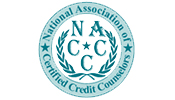
Start Now To
Eliminate Debt
- Reduce High Interest
- May Lower Payments
- Stop Collection Calls
- Stop Late/Over Limit Fees
Become Debt Free Now.
- Founded 2002
- Assisted Over 500K People
- Professional Staff
- Free Educational Services


Start Now To
Eliminate Debt
Become Debt Free Now.

Debt Management is defined as a strategy that assists in paying down debt. These days the term is often referring to a Debt Management Plan or “DMP”. A DMP is a financial product offered by banks & finance companies thru approved non-profit agencies. These plans are also commonly referred to as “debt-consolidation”.
The benefits of a DMP typically include reduced or eliminated interest rates, stopping late & over-limit fees, stopping collection calls, and re-aging the credit report. Re-aging a credit report brings an account up-to-date and current after the third consecutive on-time payment in the plan. In addition, the over-all monthly payment is often lower than current minimum payment requirements.
The benefits can assist consumer’s pay down their debt much faster than just making minimum payments. Be aware that while benefits are typically in the “ball-park” or similar from creditor to creditor, they are not necessarily the same. Banks, finance companies and other creditors set their own schedule of benefits, and some creditors offer no benefits at all. There is no law or regulation that requires a bank or finance company to offer these benefits. Creditors are under no obligation or requirement to offer debt management benefits.
There is a lot of miss-information about debt management that has been disseminated, a fair amount of which has been done by debt management or credit counseling agencies themselves. One of the “myths” is; that agencies “negotiate” with creditors on a consumer’s behalf to get the benefits. That’s non-sense, and not true. Some in the credit counseling industry have perpetuated the “negotiation myth” in TV spots and other advertising. Even though you may have heard the negotiation claim, that’s not how it really works.
The facts are as follows; each bank, finance company or creditor sets their own schedule of benefits, requirements and terms & conditions for acceptance into their debt management plan/program. The credit-counseling agency that enrolls the consumer into the program must abide by the requirements of the credit grantor. All benefits and requirements are exactly the same no matter which agency you choose to work with, so there is no “better deal” from one agency to the other. That’s not a negotiation.
Your monthly payment should be the same from agency to agency (within a few dollars). Every agency charges an administrative fee to service the program, the fee usually ranges between $20-$50 per month depending on how many accounts you include or total debt and the state you reside in.
You may be asking yourself why credit counseling or credit consolidation agencies are even involved in the process, and why banks & creditors don’t offer the plans directly. To understand why the industry works the way it does, you have to understand the origins of how DMP’s came about.
Banks first started issuing credit cards in volume in the 1950’s after WWII. The country was in good economic shape and the “baby boom” began. Credit cards were issued to allow consumers to purchase goods & services on extended credit plans. The 1950’s are referred to as the “decade of prosperity”, with economy growing by a whopping 37%. More and more consumers starting using credit cards, some getting in debt over their heads.
In the 1960’s bankruptcies started to rise and credit card issuing banks were understandably concerned. The banks got together and decided to offer DMP’s as an alternative to bankruptcy. There were some common ground rules that included consumers including all their credit accounts in the program and receiving financial education to help the consumer manage money better in the long term. The education & ground rules were not something banks were prepared to offer.
The Credit Card issuing banks funded Credit Counseling Agencies via Grants and Fair-Share. Fair-Share is a little discussed component of the Credit Counseling Industry, it’s a percentage of the debt collected that is retained by the agency enrolling the client. Fair-Share contributions by participating financial intuitions have dropped dramatically over the past decade.
That’s how the Debt Management industry got started. The next thing is to consider is if a DMP is right for you. If you are maxed out on your credit cards and having difficulty keeping up minimum payments, you should seriously consider a DMP. On the other hand, if you’re just looking for a better interest rate this is not the way to go about it.
Only those in an extreme financial hardship should enroll in Debt Management. Your accounts will be closed and no further charges will be allowed. Lots of people are overly concerned about their credit score when enrolling in debt management. The program does not affect your score one-way or the other; make your payments on time and your credit report will reflect that. Your credit score is determined by five primary factors.
Before enrolling in a DMP the credit counseling agency should assist you with completing a full budget. Be sure to list all expenses and income to give you the most accurate picture of where you stand. If you decide to enroll in a Debt Management Plan, you can usually leave one credit card out of the plan. Be sure to choose the card with lowest balance & interest rate.
“Debt Relief is the incomplete or total forgiveness of debt, or the slow down or stopping of debt growth, owed by individuals, corporations, or nations.
Debt Relief can take few of forms: lower the outstanding principal amount (either partly or fully), reducing the interest rate on loans due, increasing the term of the loan and so on.”
All content, material and software is copyright Debt Consolidation Center © 2003 - 2021